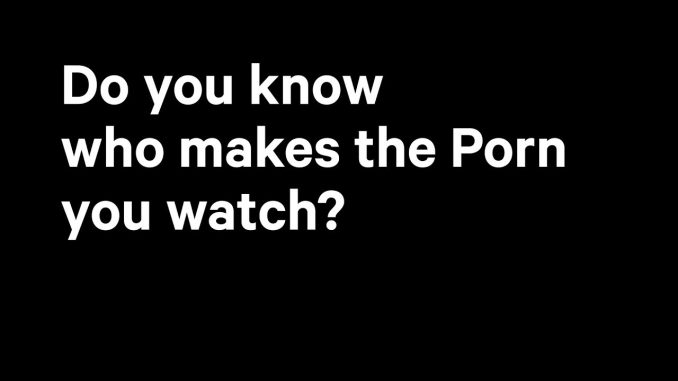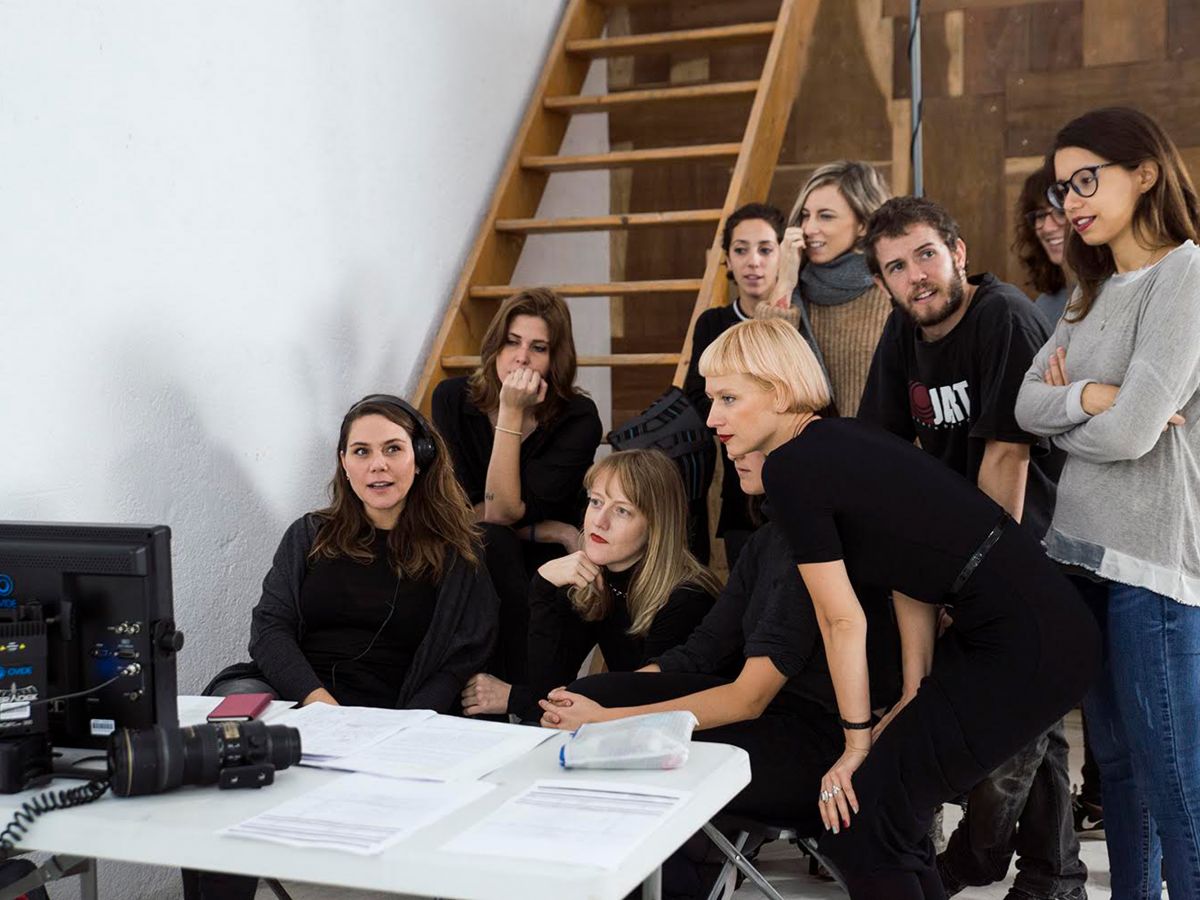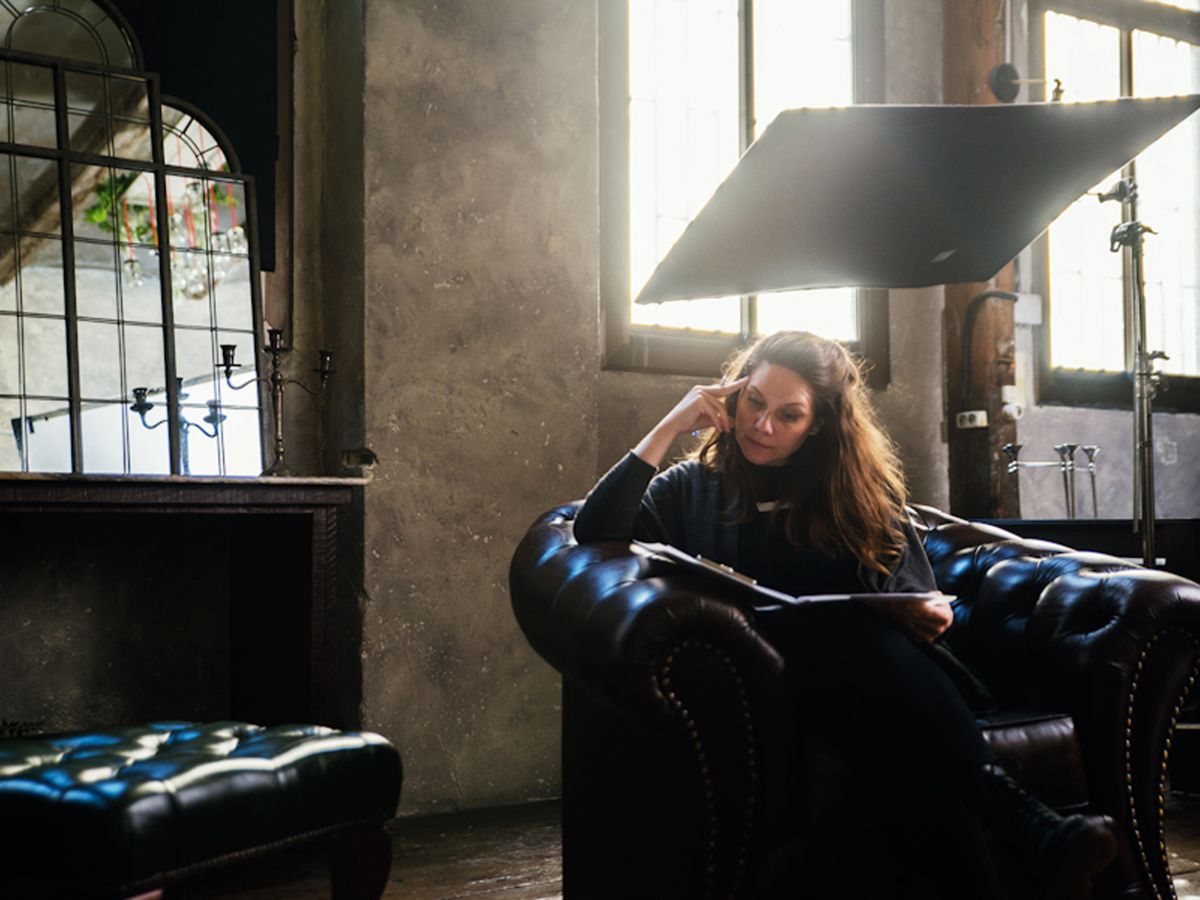

What’s the intersection between motherhood and sexuality? Perhaps no one knows better than Erika Lust, an award-winning erotic filmmaker and mother of two young daughters, aged 6 and 10. Born in Sweden and based in Barcelona, Lust (not her real name) has been creating content about female desire since 2005 and describes herself as a feminist provocateur who’s revolutionizing pornography. Her independent company, LustCinema, has grown into a veritable empire of the sexual arts, while she speaks out against misogyny and celebrates healthy and intelligent sexuality.
On the first episode of Rashida Jones’ Netflix docuseries Hot Girls Wanted, Lust explains she wants to capture the emotional aspects of sex in her work, not just erections and orifices. She achieves this through an innovative and interactive project, XConfessions, where users share their personal sex stories and fantasies. Each month, Lust chooses her favorite two fantasies (like one in which a female pianist climaxes on-stage) and turns them into short films, creating alternative adult cinema with high production value and a focus on storytelling. This is nothing short of revolutionary in the current world of porn, but she’s not done. She also wants to see a revolution in the way we talk about sex off-screen.
For example, Lust wants children to understand the difference between porn — which she says is an exaggerated performance — and complicated, real-life adult sex. To that end, she and her husband, producer Pablo Dobner, have launched a nonprofit organization, The Porn Conversation, offering free tools to help parents and teachers talk about sex and pornography with kids and teens. Their hope is for young people to be better equipped to make choices about their bodies and lives, driven by knowledge not fear. As a mother of two preteen girls myself, and a fan of her work, I was keen to ask Lust what it really means to raise sex-positive children in the age of internet porn.
I spoke to Lust via Skype from her whitewashed brick office in Barcelona. As she sat cool and carefree in a black tee shirt at her desk, surrounded by erotic film stills and a map of Sweden, she talked candidly about her work, her family, and her feminist vision for a world of erotic connection. In our conversation, ahead, we touch on everything from feminist hiring practices to Swedish sex ed, and land on real, actionable tips for any parent preparing to have “the talk” in the digital age.
What have you told your children about your job?
“My daughters know that I’m a company owner, a director, and a filmmaker. They know I appear in the media and I talk about my films and about feminism. And somehow, they are aware that I make films with a focus on eroticism, where people are often naked — they get together, they kiss, and they have sex — though obviously they don’t understand everything this involves, because of their age.”
What about porn?
“As a mother of two girls who are growing up and exploring the world, it’s difficult to talk about porn. I mean, people are so afraid even to talk about sex! And ‘porn’ is a word with so many negative connotations, of sexism and aggression towards women. Most people hear ‘porn’ and feel it’s something sleazy and nasty. But what does it really mean? Pornography is a medium where people are having explicit sex. I sometimes feel a little split in my own use of the word, because yes, of course I make porn! But my movies are so different from people’s perception of porn that I’d rather call them ‘independent adult cinema.’”
You’ve said that “porn is today’s sex education,” and as a mother of two girls, I find that really scary. What do you think parents can do to counter the dark, aggressive porn that our kids may see online?
“First we need to acknowledge that it exists. Then, we start speaking our opinion about it. We have to criticize it openly, just as we criticize other parts of society. Parents can go online and check out PornHub, RedTube, whatever, and see for themselves. Myself, I feel they’re using a horrible, misogynistic, racist language. They have offensive ads popping up about teen girls, ‘sluts,’ the very limits of what should be legal. It’s disgusting, the way they fetishize teens. We wouldn’t permit it in any other industry. The main problem is how they are using female bodies to satisfy others. And these others are men. Most people who make adult entertainment are very…basic people. I don’t know how to say this in a good way —”
That’s okay, go ahead.
“It’s a small group of people. Most of them are the kind of men who are into boobs and ass and the drinks and the cars. They show their kind of sexuality, and in the last 10 or 15 years their sexuality has gotten harder and harder. It’s like ‘Push it down her throat! I’m gonna punish this lady!’ For me, this is so far from sexuality. Instead of being sex-positive about people connecting through sexuality, which I feel is something fantastic, it’s about men punish-fucking women.”
What’s your definition of being sex-positive?
“Sex-positivity is about listening to yourself and your own body and respecting other people in their sexuality. It’s about celebrating the fun of coming together and having sex. It’s about feeling good. It’s about feeling fucking good! It’s about the energy of life.”
It’s our responsibility to tell kids that porn is an exaggerated fiction of sex.
With that in mind, how do you make ethical adult films?
“It’s all about the working conditions. It’s about talking to actors about their limits before they are on set. Is there something that they don’t like at all? What kind of lubricant do they like? Do they want to use condoms or not? They need to know they can always stop the action at any time…
“And I’m very careful that the men I hire are feminist men. They’re aware, they know how to take orders from a woman. This crew of mine creates a wonderful ambiance on set. It’s very warm and welcoming, which helps me create the intimate atmosphere I need to be able to shoot sex. Because I am shooting sex between people. Even if they’re performers who know how to do it in front of a camera, to make it extraordinary I really need them to connect. And the only way to do that is to have them feel secure.”

What were your first experiences with porn?
“I was born in 1977 and when I grew up, the first images I saw of real sex were in magazines. Later it was a videocassette that a girlfriend’s father had taped from a midnight TV screening. We were a group of girls who wanted to see what sex was really like. We were disgusted by it — and it was also ridiculous somehow!
“Now the world has completely changed. We have the internet, which is wonderful but full of risks, and in the last 10 to 15 years, pornography has become mass media. It’s impossible to avoid. Before, you could decide to have nothing to do with porn.”
Growing up in Sweden, how did your parents talk to you about sex?
“Actually, my own parents were not very good. Seriously, I didn’t have fantastic, sex-positive parents. They were kind of normal. But I had the great advantage of going to Swedish school, which had great sex education. They presented it as very natural. They started at a very young age giving us a healthy understanding of our bodies, about differences.
“We had sexologists coming to our school — not teachers, but younger people who specialized in sex education. They divided us into smaller groups, had honest conversations, answered questions, told us things about sex beyond the typical ‘Be careful!’ It was positive! We got all the practical information about STDs and pregnancy and risks. But they also gave us strategies for how you could interact sexually with someone without having to have intercourse, like petting, like touching each other with your hands.”
What age was this?
“I think it started around 12. But it wasn’t one class — it was a continuous conversation. It got more serious at 13, 14, 15. We had access to school therapists, psychologists, even a special center where we could go ask intimate questions and know it was confidential.”
Do you think this is the kind of sex education kids are getting today? I know it’s certainly not happening here in the U.S. What about Barcelona?
“No, not here either. Even though Barcelona is kind of an advanced city, the sex ed is still inadequate. It starts too late. My older daughter just turned 10 and she still hasn’t received the kind of sex and gender education I’d like her to have. She knows a lot more because we talk about it at home. She’s realizing how the world is divided, what power structure is. My girl is prepared. But her friends know very little — they’ve never heard the word feminism, they don’t know what chauvinism is.”
What about your younger daughter?
“She just turned 6. But the second one grows up faster. She told me the other day, ‘The clitoris is the key to pleasure!’”
So what’s your advice for parents who feel awkward having conversations about sex?
“Don’t be too aggressive. Don’t sit them down for a talk. Try to incorporate it into everyday life. Storytelling is very powerful. That’s part of why I make the kind of movies I do — I like giving people erotic stories. You can tell your kids stories that you’ve heard to help get the information out. And here’s my tip for parents who truly feel, Oh my god, I can’t do this! Ask a friend to do it. Maybe your sister is more open-minded than you are and can help you with this conversation.”

It’s hard to monitor everything our kids are watching online — do you think we’re supposed to be on top of it all the time?
“No, that’s too much to ask. Instead it’s about being there and being open for conversation. They have access to this technology; what can we do? It’s very hard to protect them. Our role is to guide them, to teach them critical thinking, strategies to deal with difficult situations. This is what we need to do with porn, with sex, with drugs and alcohol. We need to do it with gender issues. We even need to do it with sugar!
“There’s a lot of audiovisual content we create that’s not appropriate for kids who are 6 or 10 or 12. It’s important for us to tell our kids that adult content is made for adult people. As a parent, I want to explain that if they go online, they’re going to stumble on this material. Some of it will look shocking to them. Please turn it off. Look at something else. Don’t go there. It’s the same as with a horror movie. If you watch it, you will not be able to sleep afterwards. You will feel bad. So try not to watch it.”
And if they watch it anyway, what then?
“It’s our responsibility to tell kids that porn is an exaggerated fiction of sex. It’s not the same as sex. It’s not what adults do when they have sex. It’s like watching an action movie, with stuntmen doing things that normal people can’t do. We need to tell them that, in real life, sex is not only physical, it’s emotional. And the emotional part is more difficult. Sex is something that takes time, because it takes time to get to know our own bodies and know another person’s body and what they like — how you can work together to make it great for both of you. One of the problems with mainstream porn today is that it’s so centered on male sexuality. It’s something that women are doing for men and that men are doing to women.”
At what age do you recommend parents talk to kids about porn?
“On our new website The Porn Conversation, we give parents resources for this. We want to start the conversation, show you where you can read articles, find people who’ve already thought about the subject. We’ve made three different guides depending on the age and maturity of the child. Obviously it’s very different talking to a 9-year-old who’s just getting access to the internet than talking to a 14-year-old boy… And that’s okay! I think that we have to stand up against shame. Especially when kids are older, we can’t just dismiss all porn. We can say, ‘I look at it sometimes. I kind of like some of it. But try to be critical, try to find what aligns with your values.’”
Welcome to Mothership: Parenting stories you actually want to read, whether you’re thinking about kids right now or not, from egg-freezing to taking home baby and beyond. Because motherhood is a big if — not when — and it’s time we talked about it that way.
Click HERE to read more.
You can publish this article on your website as long as you provide a link back to this page.

Be the first to comment